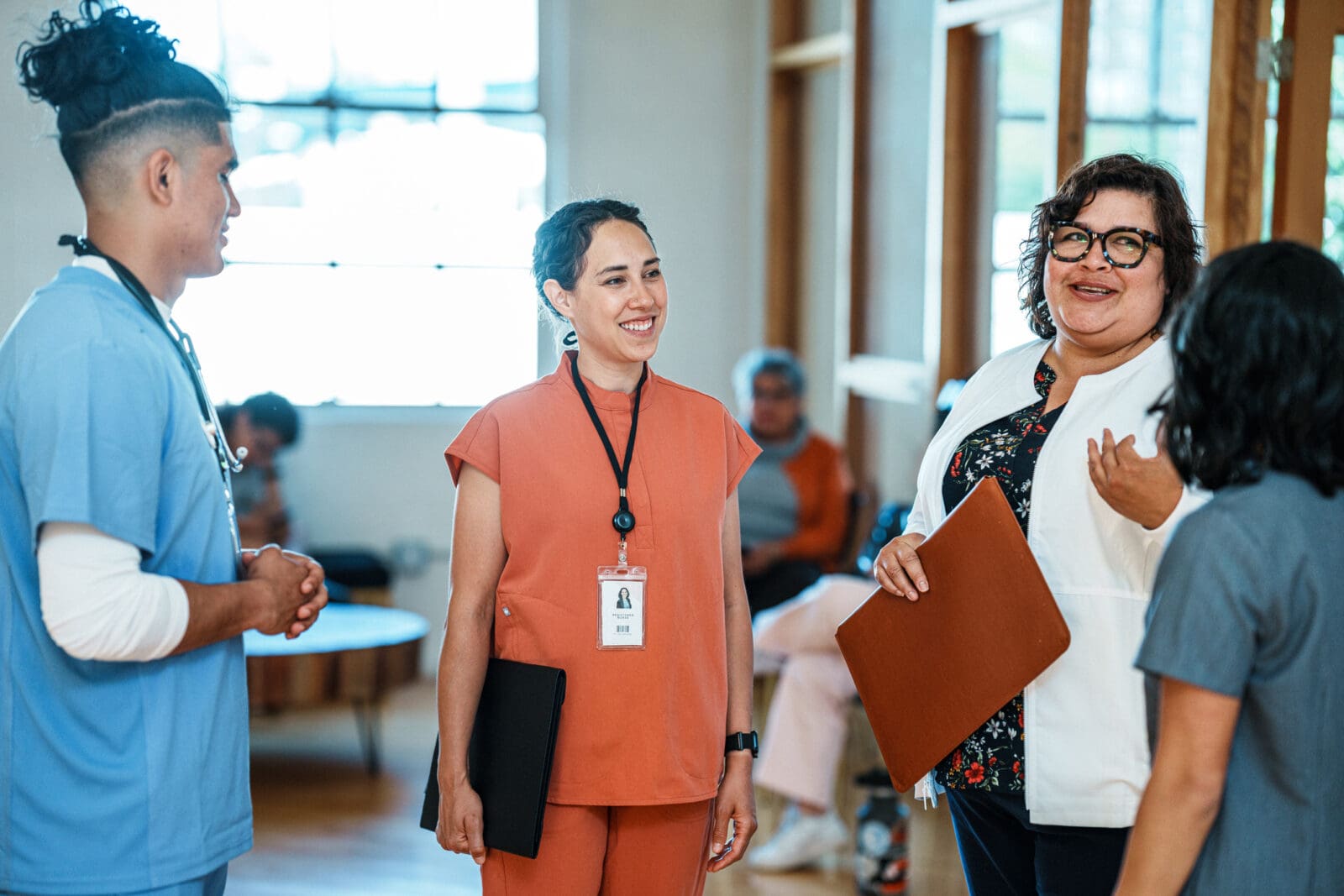
Building a Resilient Workforce: The Critical Role of Foundational Literacy Skills
By Anita Sands, Lead Policy Researcher, ETS Research Institute
Sarah Cacicio, Director, Adult Literacy and Learning Impact Network
Cheryl Lavigne, Senior Research Project Manager, ETS Research Institute
From the printing press to the internet, technological breakthroughs have reshaped how we work, learn, and engage with the world. Now, as digital innovation and AI accelerate change once again, the question isn’t just what will be disrupted but how will we adapt?
Navigating this new era of constant transformation, employers are increasingly concerned with workforce challenges. Often, these are framed in terms of skills gaps or the need for specialized knowledge. But what if the issue extends beyond these? What if the key to fostering a more adaptable, innovative workforce lies first in ensuring sufficient levels of adult literacy, numeracy, and digital literacy? These core capabilities are the bedrock of today’s most in-demand workforce competencies. Proficiency in core literacy domains supports adaptability in communication, critical thinking, and complex problem-solving.

The Organisation for Economic Co-operation and Development (OECD) affirms that literacy skills provide access to new, specialized knowledge. For adults of all ages, these skills form the foundation for learning, whether it be through formal training or on-the-job learning. Yet, according to OECD’s Survey of Adult Skills (PIAAC), 28% of U.S. adults—about 59 million people—score at or below Level 1 in literacy. These individuals may struggle with everyday reading tasks like locating simple information in short texts. Even more concerning, over half of adults aged 16–65—roughly 120 million people—score below Level 3, the level widely recognized as a minimum threshold for integrating and evaluating complex information. These skills are essential for thriving in a technology-driven, rapidly changing economy (Kirsch, et al., 2021; OECD, 2016; Kirsch et al.).
Without strong foundational skills, too many adults are shut out of opportunities for social and economic mobility—unable to fully participate in learning, civic life, or meaningful work (Fogg et al., 2022; Sands et al., 2021). This is a collective call to action. We must ensure families, communities, and economies have the adaptive, capable talent they need to meet today’s demands and thrive in tomorrow’s unknowns.
Despite increased investment in workforce development over the past decade, a disconnect remains between the programs offered and the skills employees need. In a recent article, U.S. Workers Are Falling Behind. Can They Catch Up?, Chelsea Miller of UpSkill America at the Aspen Institute, argues that strengthening foundational skills is a smart business decision—helping workers advance more effectively and ensuring employers see a return on their investment through greater engagement and competency.
Many American businesses already recognize the need for investment in foundational skill development. In a survey of 500 employers across four industries (logistics & transportation, retail & consumer goods, wholesale & distribution, and food & beverage/restaurants), the Adult Literacy & Learning Impact Network (ALL IN) in partnership with FTI Consulting found that one in three employers believe their average employee lacks the necessary literacy skills to perform their job effectively (FTI Consulting, 2023). Two in five employers acknowledge that low literacy is widespread within their companies, especially in sectors like retail and restaurants. Employers overwhelmingly reported that low literacy affects team productivity, introduces challenges with communication, and leads to greater turnover. Despite 99% of surveyed employers wanting to do more in supporting employees with literacy skills, many employers report challenges in designing and implementing effective training programs that support foundational literacy skills. In many cases, employees with low literacy skills struggle to engage in or successfully complete upskilling programs.
Some employers may also hesitate to invest in foundational skills due to uncertainties around short-term outcomes. The pressure for quick return on investment (ROI) can be overwhelming, but this perspective may overlook the broader, long-term benefits of workforce development. Upskilling for resilience can provide numerous advantages, including increased employee engagement, improved morale, and enhanced organizational agility. The Impact of Human Capital in the American Labor Market series (ETS, 2018 – 2024) demonstrated that foundational skills are related to better labor market outcomes and earnings for adults. A workforce that is better prepared to adapt to technological changes and new job demands is one that can weather economic shifts and drive business growth. A 2020 Gallup study commissioned by the Barbara Bush Foundation for Family Literacy shows that investing in adult literacy has the potential to generate 2.2 trillion dollars in annual GDP.
Closing the adult literacy gap isn’t just about boosting workforce productivity—it’s about dignity, economic resilience, and shared prosperity. When adults are equipped to think critically, solve problems, and continue learning, everyone will benefit—from employers navigating rapid change to the broader society striving for greater equity and resilience.
But addressing the adult literacy gap requires more than just a business solution; it calls for a collective effort. Employers must collaborate with educators and policy influencers to integrate foundational skills into education, workforce training, and the workplace. Researchers and practitioners must deepen their understanding of the challenges and identify the most effective solutions to support adult learners and workers. These efforts will help build a talent pipeline of skilled workers who are not only prepared to meet the evolving demands of the labor market but also equip them with the skills needed for career growth, family stability, and lifelong learning.
Recommendations for Action
Below we offer a set of high-level recommendations that funders, employers, and policy influencers can rally behind:
- Expand access to flexible, high-quality, skills-based programs. Employers and policymakers can strengthen integrated education and training (IET) and ensure foundational digital skills for all workers.
- Improve marketing and outreach for high-quality programs to boost enrollment. We know that adults with low literacy are ready to engage in upskilling: nearly all adults surveyed (84%) indicated a strong or moderate interest in developing their skills, but few (20%) reported knowing about existing programs in their communities (Condon et al., 2025).
- Integrate foundational digital skills and digital resilience into educational and workforce development programs
- Build cross-sector partnerships that connect adult education programs with industry needs—especially small and mid-sized businesses.
- Use evidence to guide decisions. Invest in high-quality data on adult skills and outcomes.
Investing in foundational competencies enhances workers’ capacity to learn, adapt, and innovate, supporting long-term resilience in a rapidly evolving economy.
About ETS
ETS is a global education and talent solutions organization enabling lifelong learners to be future ready. We advance the science of measurement to build the benchmarks for fair and valid skill assessment. We are committed to powering human progress by promoting skill proficiency, empowering upward mobility and unlocking more opportunities for everyone, everywhere.
About ALL IN
The Adult Literacy and Learning Impact Network (ALL IN) is a collective impact initiative, convened by the Barbara Bush Foundation for Family Literacy, that is dedicated to expanding access to high-quality services for adults with low literacy skills. Guided by the National Action Plan for Adult Literacy, a groundbreaking multisector initiative supported by the Dollar General Literacy Foundation, ALL IN aims to increase access, quality, and uptake of adult literacy services and support. We focus on transforming adult literacy among two interconnected groups: eligible adult learners and the education providers who serve them.
